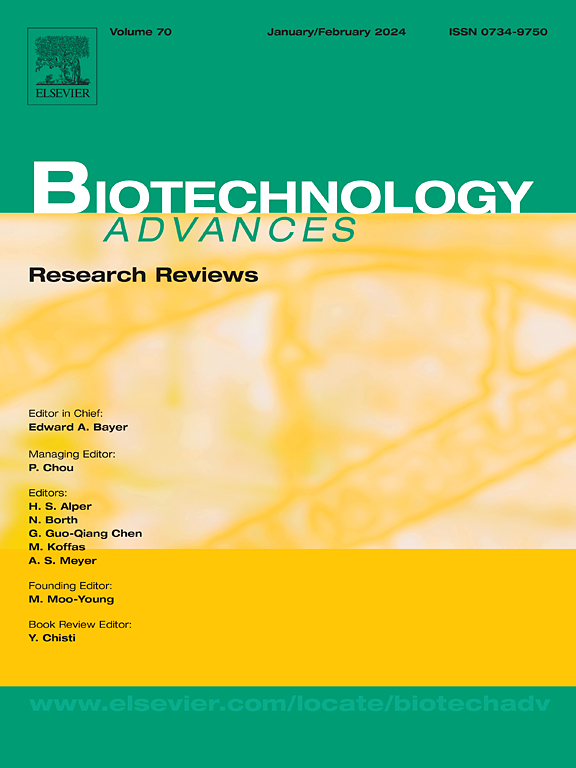Understanding low-phosphate stress responses in plants: Opportunities for genome editing to improve phosphorous use efficiency (PUE)
IF 12.5
1区 工程技术
Q1 BIOTECHNOLOGY & APPLIED MICROBIOLOGY
引用次数: 0
Abstract
Phosphorus (P) is a critical macronutrient essential for plant growth, yet its availability in soil is often limited due to poor mobility and fixation with metal ions due to acidic or alkaline soils. Plants have evolved complex adaptive responses to overcome phosphate (Pi) deficiency. Recent advancements in genome editing, particularly CRISPR/Cas tools, offer opportunities to enhance these adaptive traits for sustainable agriculture. This review consolidates current understanding of low Pi stress signaling pathways, including morphological (root architecture changes), biochemical (hormone regulation, lipid modification, organic acid exudation), and molecular (transcription factors (TFs), phosphate transporters, and microRNAs), and identifies prime candidate genes for genome editing applications. Key regulators such as phosphate transporter (PHT, PHO1), TFs (PHR1, WRKYs) and microRNAs (miR399/827) manage Pi uptake, redistribution, and signaling. Genome editing strategies targeting root-specific traits, hormonal integration, lipid remodeling, and transcriptional regulation are discussed as viable ways for improving phosphorous use efficiency (PUE). Harnessing CRISPR/Cas tools can lead to the development of crops with optimized PUE, reduced dependency on synthetic fertilizers, and improved adaptability to Pi-deficient soils. The review provides a comprehensive roadmap for researchers and breeders to apply CRISPR/Cas technology toward building next-generation crops capable of thriving under low Pi conditions.
了解植物低磷胁迫反应:基因组编辑提高磷利用效率(PUE)的机会
磷(P)是植物生长所必需的一种重要的常量养分,但由于酸性或碱性土壤中金属离子的流动性和固定性差,其在土壤中的有效性往往受到限制。植物已经进化出复杂的适应性反应来克服磷酸盐(Pi)缺乏。基因组编辑的最新进展,特别是CRISPR/Cas工具,为可持续农业提供了增强这些适应特性的机会。这篇综述巩固了目前对低Pi胁迫信号通路的理解,包括形态学(根结构改变)、生化(激素调节、脂质修饰、有机酸分泌)和分子(转录因子(TFs)、磷酸盐转运体和microrna),并确定了基因组编辑应用的主要候选基因。关键调控因子如磷酸转运蛋白(PHT, PHO1), tf (PHR1, WRKYs)和microrna (miR399/827)管理Pi摄取,再分配和信号传导。针对根特异性性状、激素整合、脂质重塑和转录调控的基因组编辑策略是提高磷利用效率(PUE)的可行途径。利用CRISPR/Cas工具可以培育出PUE优化的作物,减少对合成肥料的依赖,提高对缺磷土壤的适应性。该综述为研究人员和育种者应用CRISPR/Cas技术构建能够在低Pi条件下茁壮成长的下一代作物提供了一个全面的路线图。
本文章由计算机程序翻译,如有差异,请以英文原文为准。
求助全文
约1分钟内获得全文
求助全文
来源期刊

Biotechnology advances
工程技术-生物工程与应用微生物
CiteScore
25.50
自引率
2.50%
发文量
167
审稿时长
37 days
期刊介绍:
Biotechnology Advances is a comprehensive review journal that covers all aspects of the multidisciplinary field of biotechnology. The journal focuses on biotechnology principles and their applications in various industries, agriculture, medicine, environmental concerns, and regulatory issues. It publishes authoritative articles that highlight current developments and future trends in the field of biotechnology. The journal invites submissions of manuscripts that are relevant and appropriate. It targets a wide audience, including scientists, engineers, students, instructors, researchers, practitioners, managers, governments, and other stakeholders in the field. Additionally, special issues are published based on selected presentations from recent relevant conferences in collaboration with the organizations hosting those conferences.
 求助内容:
求助内容: 应助结果提醒方式:
应助结果提醒方式:


